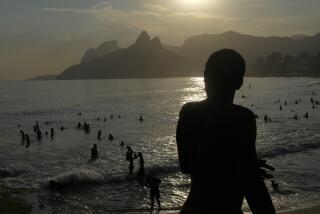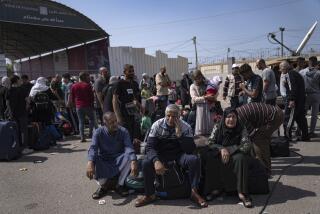Lula seeks to restore Brazil’s regional sway
Brazilian President Luiz Inacio Lula da Silva arrived in Argentina on Thursday night as part of a diplomatic offensive aimed at reasserting Brazil’s regional leadership role against a mounting challenge by Venezuelan President Hugo Chavez.
Though Lula has denied any effort to undermine Chavez’s petro-diplomacy, South American analysts see the Brazilian president responding to his Venezuelan counterpart’s oil-funded strategy to become a regional power broker -- a role Lula believes should rightly be his because his nation is Latin America’s largest and most populous.
“Brazil is returning step by step to the political initiative,” said Julio Burdman, a political analyst here. “That includes balancing the aspirations of Chavez to lead the region.”
The Brazilian president is said to be troubled by Latin America’s creeping division into pro- and anti-Chavez blocs. These splits also reflect starkly differing attitudes toward Washington, Chavez’s archenemy.
The ostensibly warm relations between Chavez and Lula mask an intense competition for political and economic influence, experts say. Venezuela has used oil revenue to win allies, but Lula is employing diplomacy and his prestige as an up-from-the-factory former union leader who is now Brazil’s widely respected head of state.
“Lula has arrived on the field, putting Chavez in his box,” former Argentine diplomat Andres Cisneros wrote in the Argentine newspaper Ambito Financiero.
Two-nation journey
Lula touched down in the Argentine capital after a visit in Santiago with Chilean President Michelle Bachelet, another leader with close ties to Washington who is wary of Chavez’s growing sway.
While in Chile, the Brazilian president said he agreed with the assessment of popular former Chilean President Ricardo Lagos that chavismo, as the Venezuelan leader’s charismatic vision of socialism is sometimes called, was illusory.
“Neither do I believe in the existence of chavismo,” Lula told reporters in Chile. “I believe in the existence of a South American conscience.”
The Brazilian president has been a strong proponent of South American integration, a vaguely defined goal that most leaders on the continent endorse in theory. But Lula has departed from Chavez’s anti-U.S. vision of integration, failing to embrace, for instance, the Venezuelan’s plan for a “Bank of the South,” a kind of alternative to U.S.-dominated lending agencies such as the World Bank.
The Bush administration, alarmed by the emergence of a pro-Chavez, anti-Washington alliance in Latin America, has warmly embraced Lula as a moderate leftist who is a role model for the region. President Bush’s visit last month to Brazil, and Lula’s subsequent trip to Washington, solidified the perception in South America that the Brazilian president -- just embarking on a second four-year term -- was keen to assume a broader profile and offset Chavez’s larger-than-life image.
“Brazil has long had a position of leadership, but in recent years it has lost that momentum,” noted Rafael Villa, a political analyst in Sao Paulo, Brazil. “Now, through diplomatic action, it is trying to recover the initiative.”
Lula has always been careful not to be seen as criticizing Chavez in personal terms and has described him affectionately in interviews. Brazilian firms have benefited from large construction contracts and other business in Venezuela, and Brazil has big energy needs.
“We don’t have any problem with Venezuela,” Lula told South American reporters this week in Brasilia, the Brazilian capital. “Chavez has been an exceptional ally in the political and commercial” realms.
“He [Chavez] runs with a Formula 1 auto, faster than us,” Lula said, using the metaphor of an auto race.
“He goes 300 kilometers an hour, while we can go 230 or 270. Everyone works at the pace that one’s country allows.”
However, the Brazilian president last week attended an energy summit in Venezuela where he pointedly refused to back down on Brazil’s strategic alliance with Washington on biofuels, which Chavez has decried. The Brazilian and Venezuelan put a friendly face on their disagreement.
Ties to U.S. defended
In comments before leaving for Chile and Argentina, Lula also defended his close ties with the United States.
“When we put our feet on the ground, we see that the U.S.A. has a very great importance for our economies and we realize that it is wise to construct other alliances,” he said. “In [North and South] America we don’t need one leader. We need very strong relations among states.”
Lula’s arrival in Buenos Aires is somewhat symbolic. It was here that Chavez denounced Bush as a “political cadaver” at a packed stadium last month just as the U.S. president was concluding his meetings with Lula in Sao Paulo.
But Lula said he wasn’t offended that Argentine President Nestor Kirchner, who cultivates close ties with Chavez, provided the Venezuelan leader with an anti-Bush forum. Lula and Kirchner are to meet today and are expected to sign a number of trade and energy accords.
“Not at all,” he responded when asked if he had been put out by Chavez’s anti-Bush rally. “I understand the political reasons that were behind those gestures. It’s part of the game.”
Andres D’Alessandro of the Times’ Buenos Aires Bureau and special correspondent Marcelo Soares in Sao Paulo contributed to this report.
More to Read
Start your day right
Sign up for Essential California for news, features and recommendations from the L.A. Times and beyond in your inbox six days a week.
You may occasionally receive promotional content from the Los Angeles Times.






